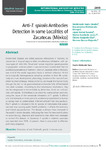
Please use this identifier to cite or link to this item:
http://ricaxcan.uaz.edu.mx/jspui/handle/20.500.11845/679| Title: | Anti-T. spiralis Antibodies Detection in some Localities of Zacatecas (México) |
| Authors: | Maldonado Tapia, Claudia Bracamontes Maldonado, Nitzaye López Bernal, Susana Muñoz Escobedo, José Jesús Chávez Guajardo, Elsa Moreno García, María Alejandra |
| Issue Date: | 2015 |
| Publisher: | International Medical Society |
| Abstract: | Transmitted diseases are called parasites infestations in humans. Its prevalence in tropical regions often simultaneous infestation with various types of helminths. Travel and human migration spead parasites to geographic locations where it was not known. is estimated that the worldwide prevalence of helminth infection, exceeds other onfections, one third of the world population hosts a helminth infection. Which are biologically heterogeneous sampling variation in their life cycles, body structure, development, physiology, location in the host and sensitivity to chemotherapy. Immature forms can invade the human body through the skin or via gastrointestinal and evolve fully differentiated into adult parasites. According to the transmission mechanism, they can be categorized as transmissible by defecation, food, soil and animals arthropods. Trichinellosis is an endemic cosmopolitan zoonosis, being the cause of the nematode infestation of T. spiralis. It affects wild and domestic animals primarily accidentally transmitted to human by eating meat or undercooked, infected animals from raw products. The T. spiralis is indicated in the 32 species of nematodes that parasitize man also causing public health problems, it affects the economy and Animal pig production. The disease outbreaks have increased in the world in recent decades, indicating the need for new contributions on epidemiology, diagnosis and treatments that allow new strategies to control this disease. In Zacatecas T. spiralis is endemic zoonoses was reported since 1976. At present there is conducted its effective and timely diagnosis. Objective: Detection of anti-Trichinella spiralis in human sera. |
| URI: | http://localhost/xmlui/handle/20.500.11845/679 https://doi.org/10.48779/sc8x-bx55 |
| ISSN: | 1755-7682 J |
| Other Identifiers: | info:eu-repo/semantics/publishedVersion |
| Appears in Collections: | *Documentos Académicos*-- UA Ciencias Biológicas |
Files in This Item:
| File | Description | Size | Format | |
|---|---|---|---|---|
| Anticuerpos humano. Zacatecas..pdf | 3,24 MB | Adobe PDF |  View/Open |
This item is licensed under a Creative Commons License
